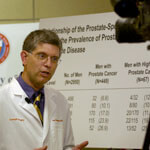
San Antonio (June 8, 2004) – Some men who have received good marks on the prostate-specific antigen (PSA) test from their physicians may be getting a false sense of confidence about not having prostate cancer, according to a study released May 27 in The New England Journal of Medicine.
The results of the Prostate Cancer Prevention Trial (PCPT) were announced last June in Washington, D.C. Additional information gleaned from this study has enabled researchers to study the risk of prostate cancer in men who had what physicians consider “normal” PSA scores – under 4.0 nanograms per milliliter (ng/ml). Of 2,950 men who throughout the trial always had PSA scores below 4.0, a surprising 15 percent (449 men) had prostate cancer. Not only that, 67 of the men had high-grade cancers, the type of cancer that poses the greatest risk.
“There are many men who have been told that, based on their PSA score, they don’t have prostate cancer,” said lead author Ian M. Thompson Jr., M.D., professor of surgery and chief of urology at The University of Texas Health Science Center at San Antonio, one of the institutions that participated in the PCPT. “Based on this study, we now know they have a substantial risk of cancer and some can have high-grade disease. Waiting for a PSA level to go above 4.0 may be too late in some men.”
The number of U.S. men who have been told they have “normal” PSA readings is estimated at 25 million to 35 million, researchers said.
“There is no PSA value below which a man can be assured that he has no risk of prostate cancer,” wrote the authors, who include Leslie G. Ford, M.D., of the National Cancer Institute (NCI) and Charles A. Coltman Jr., M.D., chairman of the Southwest Oncology Group, one of the largest NCI-supported cancer clinical trials cooperative groups in the United States.
The results suggest that men as young as 40 with a strong family history of prostate cancer and a PSA level even lower than 2.0 should seek consultation with their physicians. “I am familiar with a family in which every man had prostate cancer in his 40s,” Dr. Thompson said at a briefing at the Cancer Therapy and Research Center, the clinical partner with the Health Science Center in the San Antonio Cancer Institute, an NCI Clinical Cancer Center.
“The bad prostate cancers in the men with normal PSA scores may be more numerous than all the prostate cancers we are currently detecting,” Dr. Thompson added. “It calls into question whether our definition of prostate cancer risk is correct.”
The new study reveals the need for a more specific test for prostate cancer, Dr. Thompson said. “Very clearly, we can’t tell for sure which prostate cancers are slow growing and which are aggressive and we need a screening test that doesn’t just find cancer – it finds only those cancers that will cause problems in an individual man. Certainly, a man who is at risk of prostate cancer should think about the use of finasteride, the agent we demonstrated last year that can reduce the risk of prostate cancer by 25 percent. If you don’t ever get prostate cancer, you don’t have to worry about whether it is aggressive or not. From a philosophical standpoint, what we need to do is a ‘Manhattan Project’ of prostate cancer, an intensive, large-scale study of men who are characterized by family history, medications, diet and genes, and follow them for 20 years. Then we would have a much clearer picture.”
Men should speak with their physicians about the possibility of a prostate biopsy, which can be done on an outpatient basis in the doctor’s office, Dr. Thompson said.
Dr. Coltman, in his role as director of the Southwest Oncology Group, served as principal investigator on the study and Dr. Thompson served as clinical coordinator. The Fred Hutchinson Cancer Research Center at The University of Washington, Seattle, provided statistical support. Other co-authors are from The University of Texas M.D. Anderson Cancer Center and The University of Colorado Health Sciences Center.

